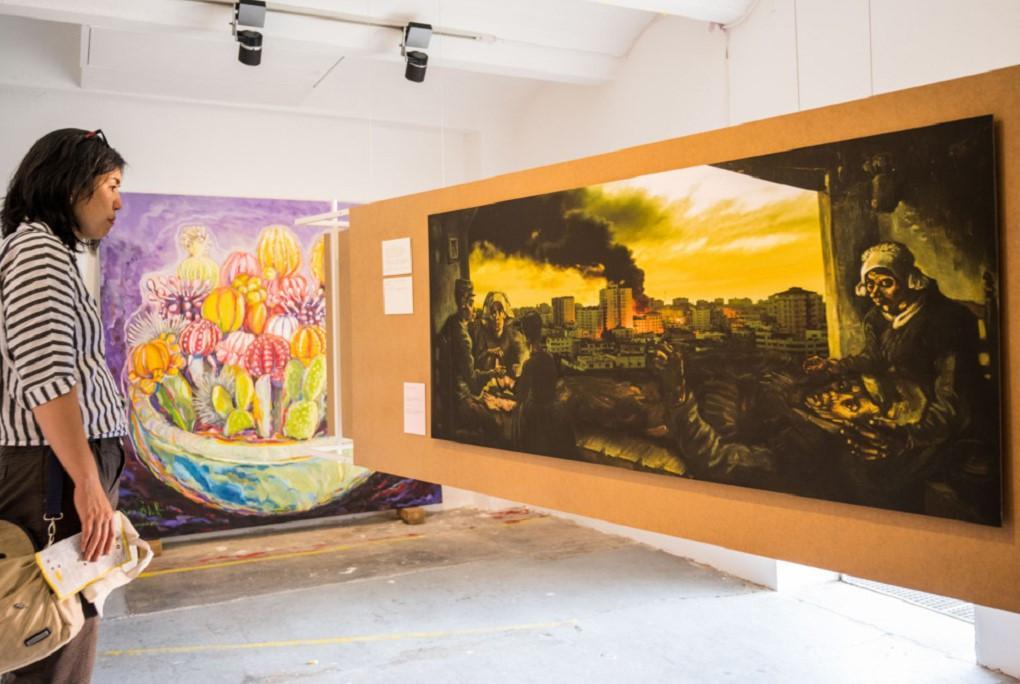
Break-ins and vandalism, accusations of racism and anti-Semitism and a giant compost heap: Documenta, one of the world’s biggest art fairs, opened under a cloud of controversy.
The exhibition, which turns the sleepy German city of Kassel into the center of the art world once every five years, kicked off on June 18 after months of bitter rows.
“Documenta has always been a place of exchange and heated debates,” Hesse state culture minister Angela Dorn said ahead of the 15th edition.
Over 100 days the wildly disparate works of more than 1,500 participants will be displayed at 32 sites across the city, with more than one million visitors expected.
For the first time since its launch in 1955, the show is being curated by a collective, Indonesia’s Ruangrupa.
The group’s decision to turn the spotlight overwhelmingly on artists from the Global South rather than Europe or the United States has opened up the event to a much broader range of perspectives.
“Documenta promises to be radical, from who is invited to the art, to the venues,” its director Sabine Schormann told reporters.
However the inclusion in particular of a Palestinian artists’ group strongly critical of the Israeli occupation has sent sparks flying.
An anonymous blog posted by an “Alliance Against Anti-Semitism Kassel” in January accused the collective called The Question of Funding of having links to the BDS boycott Israel movement.
BDS was branded anti-Semitic by the German parliament in 2019 and barred from receiving federal funds. Around half of Documenta’s 42-million-euro ($44-million) budget comes from the public purse.
Several German media outlets picked up the criticism, prompting Ruangrupa to release an open letter condemning “bad faith attempts to delegitimize artists and preventively censor them on the basis of their ethnic heritage.”
Last month unknown vandals broke into the Palestinian exhibition space, leaving threatening graffiti scrawled on the walls.
A visit this week showed that at least one of the tags was still visible among a series of paintings and photographs documenting the hardships of life in Gaza.
A series of collages by Mohammed al-Hawajri combines the pictures from Gaza with Picasso’s anti-war masterpiece Guernica and other classic images of Western art by the likes of Delacroix, Chagall and Van Gogh to explosive effect.
Federal Culture Minister Claudia Roth has thrown her weight behind Ruangrupa and its guests, saying that while Germany understood its responsibilities due to its Nazi past, politically minded Muslim artists should be welcome.
Noting that Indonesia did not have diplomatic relations with Israel, she said: “I may not like that. But that can’t mean that an artist or collective from Indonesia is suspicious per se.”
News magazine Der Spiegel called the affair an embarrassing spectacle, saying “the German cultural sector has a big problem” with the tensions between artistic freedom, respect for minorities and the burden of the country’s dark history.
Documenta began in 1955 in Kassel, which was home to a vast forced labor camp during World War II and was heavily bombed by the Allies.
It aimed to put Germany back on the cultural map after the Nazis’ campaign to crush the avant-garde.
Documenta now ranks with the Biennale in Venice among the world’s premier showcases of contemporary art.
At one of the main venues, Kenya’s Wajukuu Art Project has installed a new entrance made of corrugated iron recalling Nairobi’s vast slums.
Its pitch-dark tunnel is disorienting for visitors on arrival, an effect replicated in many of the Documenta venues including a repurposed cellar sex club.
In a park in front of the city’s baroque Orangerie, Nairobi’s Nest Collective has dumped textiles and electronic waste in a work entitled “Return to Sender”.
On the same field - and certain to draw the sniffs of Documenta sceptics - a compost pile complete with a toilet for guests to help fertilize the soil has pride of place, underlining a message of creative renewal.
Alongside sculpture and video installations are a Vietnamese herbal sauna, a halfpipe ramp for skateboarding and multimedia works documenting freedom struggles of Algerian women, black people in the Netherlands and Australia’s Indigenous communities.
Documenta runs until Sept. 25.